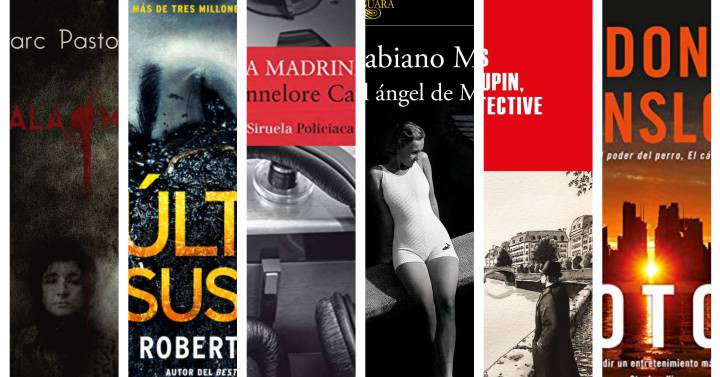After exhausting much of their heavy artillery after the end of the confinement, not the pandemic, the publishers have saved little material, although sometimes very interesting, for the second half this particular summer. We have already reviewed the hatching and titles of June, all valid to have a great time this August, but let's see what remains. There is some great name (especially Don Winslow's), recoveries of classics (Charles Willeford or Edgard Allan Poe) some French surprise and a constant commitment to the hybrid historical novel-crime novel that has given so many returns. We are not talking now about contemporary classics like Philip Kerr or Ben Pastor and their procedures set in the Nazi era (so different and so extraordinary in the two cases) but about an even more historical perspective. The year started off well with Niklas Natt Och Dag and his1793 (Salamandra) - what a debut! - or the French classic Hervé Le Corre y su Bajo las llamas (Reservoir Books) and it continues at a good pace.
MORE INFORMATION
The crime novel is immune to the virus
Historical novel and crime novel: an effective symbiosis
Ambrose Barry is the pseudonym of vital and now artistically formed marriage Chris Brookmyre and Marisa Haetman - writer he, anesthetist and researcher she - who elaborate in The Corruption of the Flesh (Salamandra, translation by Catherine Martinez) an illustrator historical thriller set in Edinburgh to mid-19th century. All the information on the medical development of the time plays in favor of the novel, with rigor and without overwhelming. Also the rhythm and the plot, very entertaining. And the crude description of the brutality of the Old City gives it the final ingredient.
So in vogue is the look into the past in the criminal genre, and there is so much to choose from, that Alianza rescues La mala mujer , by Marc Pastor (not to be confused with Ben, actually María Verbena Volpi, Italian-American), a book published in 2009 by RBA and that goes back to the beginning of the 20th century in Barcelona's Raval to tell us about a case of disappearances of the children of prostitutes. Investigated by the couple formed by Moisés Corvo and Juan Malsano, the book focuses on the classic theme of the pedophile network to nurture powerful perverts but it has a powerful twist.
We can say that The Munich Angel is one of the thrillers of the year. Fabiano Massimi's book (Alfaguara, translation by Xavier González) is the result of years of research by the author on a decisive but not very addressed episode in history: the 1931 murder of Hitler's niece. With this premise, Massimi assembles a novel with classic elements —the pair of detectives who investigate him, who take the names from the reals but who are the part that enters most fully into pure fiction—, brilliant twists and an impeccable historical setting through which he portrays the tensions that were experienced in Germany at the dawn of the Nazi rise to power and the disputes around Hitler that ended with the lamination of the SA and the elimination of leaders - by chance? - that they could have the key to the case.
A great name
Don Winslow is the great figure on the news table in recent weeks. The author of The Frontier (Harper Collins) comes to the bookstores with Rotos (translation by Victoria Horrillo), a set of six uneven short novels but with excellent examples of good police literature. It is always interesting to see an author who is so fond of large format working on shorter paths.
Let's review the three most interesting. The story that gives the book its title and opens it is an intense plot of police and revenge in New Orleans with all the ingredients of an action film: rhythm, violence and spectacle. There is no place here for the moral disquisitions of the protagonists of the trilogy opened by The Power of the Dog , but the result is remarkable. The second story is a complete change of record. In Code 101 we have a skilful and charismatic thief, discreet and attractive, who programs his life around his perfect punches. But something has to go wrong, of course, because there are few good robbery accounts other than a robbery ending badly. And every story of a thief is also of a person who persecutes him. The book is worth buying just for this small sample of impeccable genre from start to finish. The third is The Last Race , in which Winslow, who has described the world of drug trafficking as nobody else, returns to the territory of the border, the one he knows and controls best (he lives in San Diego and spent 12 years investigating for The Border) to give us the crudest and most political account of all, a small novel within the genre that, now, has a moral scope.
Recovered classics and a couple of surprises
Charles Willeford (1919-1988) is a classic of the American crime novel. Creator of Hoke Moseley, the unforgettable protagonist of Miami Blues , the rest of his black criminal work has not been widely promoted in Spain (Sakhalin has published, for example, the crude fighting cock ). Now it comes from the hand of RBA, with a translation of Pilar de la Peña, A masterpiece . It is a story of thefts and art that has much more behind it. Willeford's ability to create characters with moral conflicts is seen here in all its expression in the journalist who has the opportunity of his life if he does the right thing and the opportunity of a much richer and more glamorous life if he is inclined to violate the law.
The other classic that returns to bookstores recurrently is Edgard Allan Poe, the father of the modern detective, with his stories of Dupin. In this case, it is those from Peripheral who bet on The Mysteries of Auguste Dupin , the first detective, which includes his first three cases. Do not pay as much attention to the mythical Murders on the rue Morgue, as to the brilliant The Stolen Letter or The Mystery of Marie Rôget , where part of our contemporary fascination for t crime is already .
In the field of surprises, as a coda to this brief list of novelties we can include The Godmother of Hannelore Cayre (Siruela, translation by Susana Prieto), a true phenomenon in France. Starring Paciencia Cienfuegos (translator from Arabic to the French Ministry of Justice, owner of a dog, mother of two daughters, girlfriend of a police officer and so on) who, tired of being defined by what she is in relation to others, crosses the line and become a dealer. The budget, unlikely risky, is resolved with grace and arrogance.
We finish with Último suspiro , by Robert Bryndza (Roca, translation of Santiago del Rey), a beach thriller by the author of the hit I'll see you under the ice with young victims, a seasoned policewoman, countdown to save the last kidnapped by the bad guy and all the ingredients of a thriller that gives everything it promises and perfect for those who are looking for a smooth page-turn.






